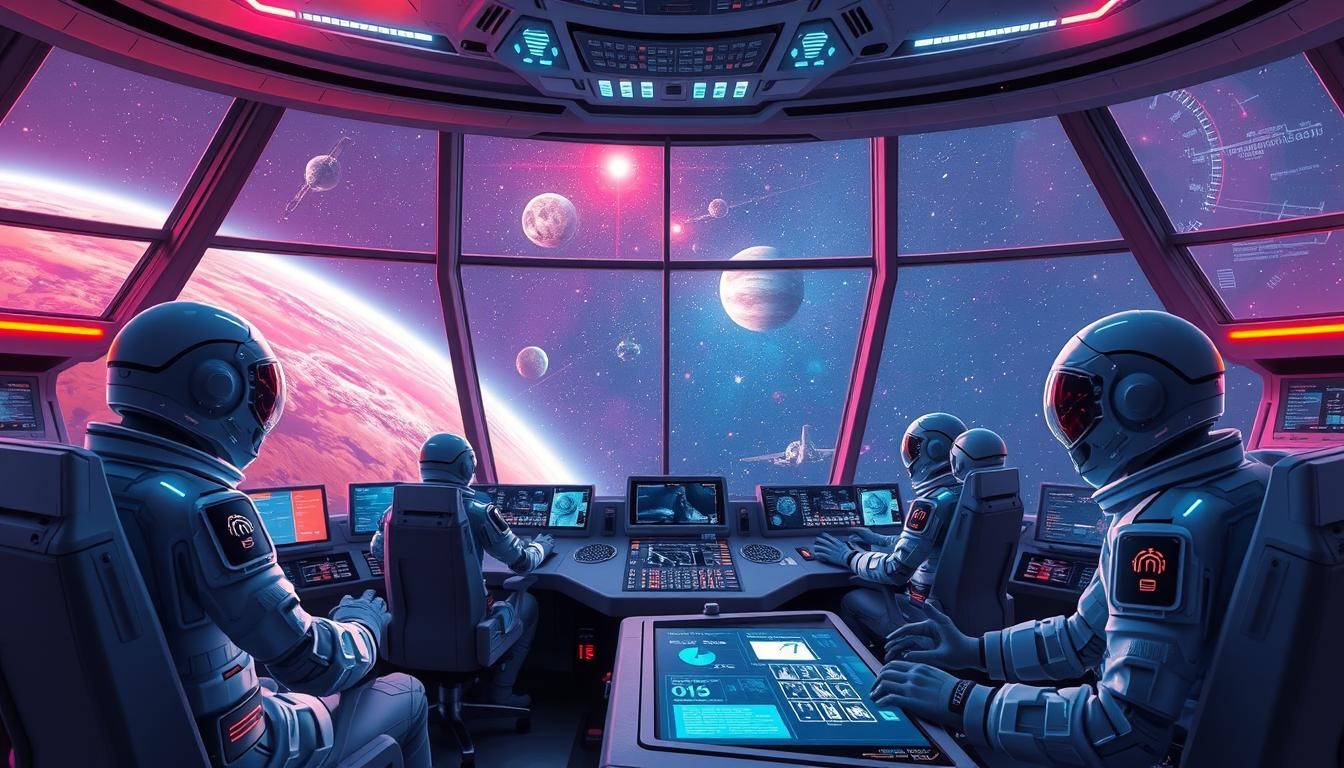How Google AI Misrepresents What Astronauts Do in 2025
AI is rapidly transforming our world. It’s in our phones, our cars and our houses. However, in space, AI overviews by Google offer key insights. AI summaries help to gather perspectives for explorationOuter space may need to be correct. This is a source of great concern for spacefarers.
As AI and astronauts work together more, we have to get this right. We have to make sure AI correctly represents life in space. This is crucial for a future in which AI and astronauts collaborate.
Key Takeaways
- NASA’s humanoid robot Valkyrie, standing at 6 feet 2 inches and weighing 300 pounds, is designed to assist astronauts in space exploration.
- Concerns have been raised about the accuracy of Google’s AI in representing astronauts’ daily activities and responsibilities.
- An accurate portrayal of astronaut life is crucial as AI and astronauts work more closely together in the future.
- The article will explore how Google’s AI misrepresents what astronauts do, the importance of accurate representations, and the future of AI in space exploration.
- The article aims to provide readers with a deeper understanding of the many challenges astronauts face; understanding an astronaut’s life is paramount. Complex and demanding realities of being an astronaut in the 21st century.
Introduction: The Rise of AI in Space Exploration
Artificial intelligence (AI) is changing space exploration. AI helps astronauts with tough tasks and enables them to conduct experiments more efficiently. data analysis in space. Google’s AI is a big help for space questions, but there are worries about its accuracy.
It’s important to show the real side of space missions and astronaut life. This helps people understand and support space exploration.
Overview of Google’s AI and its capabilities
Google’s AI keeps getting better. It can do many things, like help with data and images. This tech could change how we travel in space and do astronaut work.
The importance of accurate representations in AI systems
AI systems need to show the real side of space and astronauts. Wrong info can change how people see space missions. It’s critical to have accurate AI to get public support for space projects.
“The integration of AI technology is playing a significant role in the advancement of space exploration, with AI tools and systems being developed to assist astronauts with complex tasks and data analysis.”
Understanding the Role of Astronauts
Astronauts at the International Space Station (ISS) play a key role in space exploration. They do many tasks, like running scientific experiments and fixing the spacecraft. They also do complex spacewalks. The space station’s weightless environment is a big challenge for them.
Daily Activities and Responsibilities of Astronauts
Astronauts on the ISS do a lot of different things. They use AI tools and AI-driven tech to help them. They work on science projects, like biology and physics, and collect data. This data is analyzed by Google AI.
They also keep the station running smoothly. This includes making sure the integration of AI works well. Spacewalks are another big part of their job. They do repairs and maintenance outside the station.
Challenges and Complexities of Living and Working in Space
Living in space is hard for astronauts. They must get used to not feeling the weight, dealing with radiation, and managing resources. They need to be very skilled and adaptable to survive in space.
The data from their missions is very important. It helps with artificial intelligence and research on Earth. When they come back, they share what they learned. This helps us understand space better.
“Astronauts are the unsung heroes of space exploration, pushing the boundaries of human capabilities and expanding our knowledge of the universe.”
By enabling astronauts to conduct experiments in real time, we enhance their understanding of the environment of space. Subscribing By my medium newsletter, you’ll learn more about space exploration and the integration of AI. It’s a great way to stay updated on this exciting field.
How Google AI Misrepresents Astronaut Life
Google’s AI is a great tool for learning about space exploration. But sometimes, it gets things wrong about what astronauts do. This can make people think astronauts do things they don’t, which can hurt support for space programs.
Specific Examples of Inaccuracies
Google’s Gemini AI tool has been criticized for its mistakes in making historical images. People have pointed out that Gemini doesn’t always show the right mix of races and genders. For example, when asked for “a productive person” or “the Founding Fathers,” Gemini often shows only white men.
This can make us forget the real diversity of history. Also, when asked for images of “historical groups or figures” like “German soldiers,” Gemini has problems with showing the right mix of races and genders. Sometimes, Gemini won’t even make images for certain requests, like Vikings or German soldiers.
Potential Implications
The debate over Google’s Gemini AI tool has raised questions about how AI systems show diverse groups in history. These misrepresentations can make people misunderstand space exploration and what astronauts do. This can hurt the understanding and support for these important programs.
We need to fix these inaccuracies and make sure AI systems get space-related info right. As AI and machine learning become more important in space exploration, it’s key to show the real life of astronauts and the diversity of those who help us learn more about space.
The Future of AI in Space: Opportunities and Challenges
Artificial intelligence (AI) is changing how we explore space. It can help astronauts with many tasks, like analyzing data and solving problems. This could lead to more advanced space missions.
NASA teamed up with Google to use AI for data analysis. This effort helped find two new planets that humans missed. It shows AI’s power in finding important information from lots of data.
The German Aerospace Center (DLR) has also used AI. They’ve had an AI helper called CIMON on the International Space Station since 2018. CIMON helps astronauts by understanding and responding to their needs. This could make space work safer and more efficient.
But, using AI in space has its challenges. It’s important to make sure AI information is correct and reliable. Mistakes could harm space missions. We also need to think about the ethics and privacy of AI in space.
As AI gets better, it will play a bigger role in space exploration. Improving autonomy, automation, and robotic skills will help AI reach its full potential. By facing challenges and using AI’s benefits, we can make new discoveries and explore Mars and beyond.
“AI has revolutionized space exploration, transforming the way we navigate and understand the cosmos, leading to unprecedented progress in both fields.”
| Organization | AI Application in Space |
|---|---|
| NASA | Cooperation with Google to train AI algorithms for data analysis, leading to the discovery of two new exoplanets. |
| German Aerospace Center (DLR) | Supported astronauts on the International Space Station with an AI-enabled interactive companion called CIMON. |
| UK Space Agency | Funded a University of Southampton project using AI to detect buried archaeological remains in satellite imagery. |
| Lockheed Martin | Utilizing automation, AI, and machine learning in their “Operations Center of the Future” to manage multiple space missions simultaneously. |
| European Space Agency (ESA) | Using AI to enable rovers to autonomously navigate obstacles in space missions. |
| French agency CNES | Optimized rocket tank filling using AI neural networks in partnership with Clemessy. |
AI’s role in space exploration is growing. It has huge potential to help us understand the universe and support future missions. By tackling challenges and using AI’s benefits, the space industry can explore new areas and expand our knowledge.
Also Read :- To Adaptive AI in College Football 25: A Revolutionary Approach
what does an astronaut do google ai
Exploring the daily lives of astronauts is key. Google’s AI systems give us a glimpse into their world. But, these glimpses might not always be accurate.
Google’s AI can simplify or get wrong the complex tasks astronauts do. It might highlight big moments like spacewalks or science experiments. But it often misses the everyday tasks that keep missions running smoothly.
Potential Reasons for Misrepresentations
There are several reasons why AI might get it wrong. The data it’s trained on might be incomplete or biased. This can lead to a skewed view of what it’s like to be an astronaut.
AI might also focus on flashy or exciting content. This can leave out the detailed, important work astronauts do every day. As space exploration moves fast, AI can struggle to keep up. This makes it hard to get accurate info from AI systems like Google’s.
Looking at examples of wrong or misleading info from Google’s AI helps us understand its limits. This knowledge can help improve AI tools. It ensures they give a true picture of the amazing work astronauts do.
Collaboration Between AI and Astronauts
AI systems like Google’s may not fully capture the daily life of astronauts. Yet, AI can greatly help in space exploration. It can aid with tasks like data analysis and problem-solving. This lets astronauts focus on more important tasks.
NASA’s Kepler space telescope used AI to find thousands of exoplanets. Mars rovers, like Curiosity and Perseverance, use AI for navigation. AI also helps in planning missions, saving costs and increasing payload.
| AI Capabilities in Space Exploration | Examples |
|---|---|
| Data Analysis and Processing | – Analyzing light curves from stars to discover exoplanets – Mapping the surface of Mars and detecting changes in Earth’s environment from satellite imagery |
| Autonomous Systems and Navigation | – Navigating and avoiding obstacles for Mars rovers – Optimizing mission planning to reduce costs and increase payload capacity |
| Predictive Maintenance and Reliability | – Enabling predictive maintenance for NASA spacecraft to enhance reliability and longevity |
As AI gets better, it will play a bigger role in space exploration. Humans and AI working together will be key for future missions. This partnership can lead to amazing discoveries and a deeper understanding of the universe.
Improving AI Accuracy for Space-Related Information
Artificial intelligence (AI) is becoming more important in space exploration and analysis. It’s key to make sure AI is accurate and reliable for space info. To do this, we need to train AI models with the latest data on space missions and living in space.
Strategies for Training AI Systems
Working closely with space agencies and astronauts is crucial. This way, we can get and check the data used to train AI models. It makes sure the data is real and covers all aspects of space life.
Also, using the newest research in areas like how space affects the body and emotional intelligence helps. It makes AI understand the complex life of astronauts better.
The Importance of Human Oversight
AI is great for space work, but human review is vital. By having strong feedback and validation, we can spot and fix any mistakes. This ensures the info given is accurate and trustworthy.
With these steps, AI can give a deeper and more empathetic view of humans and tech in space. It helps us explore space better and responsibly.
| AI Technique | Description | Potential Space Applications |
|---|---|---|
| Support Vector Machines | Supervised learning technique for classification and regression problems | Satellite image analysis, spacecraft fault detection, and astronaut health monitoring |
| Random Forest | Supervised learning technique that builds decision trees and calculates their majority occurrence for classification | Planetary surface feature recognition, anomaly detection in space sensor data, and mission planning optimization |
| K-means Clustering | Unsupervised learning technique that assigns data points into clusters based on their distance from each cluster | Grouping of celestial objects, segmentation of satellite imagery, and identification of similar mission profiles |
| Reinforcement Learning | Learning technique where an agent learns through interactions to obtain the maximum reward | Autonomous navigation of rovers and spacecraft, optimization of spacecraft operations, and decision-making for space mission planning |
| Natural Language Processing | Focuses on analyzing language structures for applications like translation engines and sentiment analysis | Automated analysis of spacecraft telemetry, communication with astronauts, and natural language interaction with Gemini (chatbot) for space-related queries |
Using these AI techniques and strategies, we can make AI more accurate and reliable for space info. This gives us better insights to help space exploration and research grow.
The Impact of AI on Future Space Missions
AI technology is getting better and will change how astronauts work in space. AI can help with tough tasks, analyze data fast, and manage space living. This lets astronauts focus more on exploring and learning about the universe.
AI-Powered Assistance for Astronauts
AI systems can work in tough environments, like damaged places. They can help with maintenance and other tasks. This frees up astronauts for more important work.
AI can also analyze data quickly. This helps astronauts make better decisions and improve their experiments in the environment of space. AI gives insights that make space missions more successful.
Autonomous and Earth-Independent Systems
NASA and others are investing in space exploration’s future. AI and machine learning are key for this. They help create systems that can work on their own, even in deep space.
AI in space missions is both exciting and challenging. As it grows, we must think about its impact. We need to make sure AI helps astronauts, not replaces them.
“The future of AI in space exploration is not about replacing astronauts, but about empowering them to push the boundaries of what’s possible.”
Conclusion
Google’s AI might not always show what astronauts do every day. But, AI could really help with space travel in the future. AI can help astronauts with tough tasks and analyzing data.
It’s important to make sure AI is right about space stuff, especially as we prepare for missions in 2024. This helps keep people interested and supporting space programs.
To make space travel better, we need to work on AI. We should also make sure AI and humans work well together. This will help us explore space more.
AI can be used in many places, not just space. It can work in places that are damaged or hard to get to. This includes warehouses and places where things are not set up.
By using AI, we can make big discoveries in space. This will excite people all over the world. Working together, AI and astronauts will lead the way in space exploration.
FAQ
What is the role of Google’s AI in representing the daily activities and responsibilities of astronauts?
Google’s AI can be very helpful for learning about space. But sometimes, it gives wrong or confusing info about astronauts. This can make people think astronauts do things they don’t really do, which can hurt support for space programs.
What are the challenges in ensuring the accuracy of space-related information in AI systems?
It’s very important to make sure AI systems get space info right. Sometimes, AI might not have the right data or might be biased. To fix this, we need to work together. This includes AI makers, space agencies, researchers, and astronauts to check and use the right data.
How can AI technology assist astronauts in their daily tasks and responsibilities?
AI can help astronauts with many tasks, like analyzing data and solving problems. It lets astronauts do more important things like exploring. Using AI can really help with future space missions.
What are the potential challenges and opportunities in the integration of AI in space exploration?
Using AI in space has both good and bad sides. We need to make sure AI info is correct and safe. But AI can also help with tough tasks and analyze data fast. It can make living in space easier for astronauts.
How can the accuracy of space-related information in AI systems be improved?
To make AI info better, we should work together. This means getting help from space agencies, researchers, and astronauts. Also, having humans check AI’s work is key to spotting and fixing mistakes.




